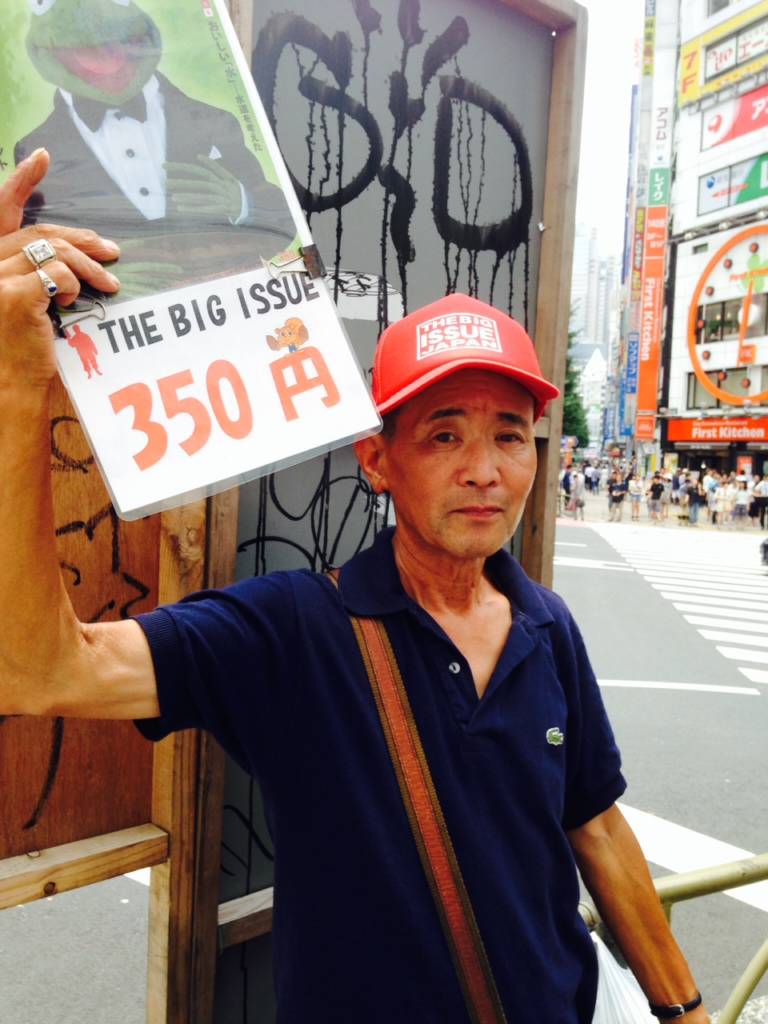Tokyo, Japan — Kazuo Fujioka has a message for his homeless counterparts selling issues of Street Sense on the other side of the world in Washington, D.C.
Don’t give up. And don’t take a day off.
Standing on crowded street corner in the heart of the mega metropolis of Tokyo, Fujioka, 62, donning a bright red hat, carefully checks over the issues of the magazine he’s selling called the “Big Issue Japan.”
Fujioka has been selling the magazines at the mouth of the Shinjuku metro stop — one of the busiest in the world — for the past five years since he fell on hard times and lost his home. The magazine is published on behalf of and sold by homeless and vulnerably housed people.
Fujioka, wiping the sweat that’s gathered under the brim of his hat, said he’s successfully secured a group of regular customers and now earns a small but steady income. The key, he said, is continuing to show up every day at the same corner, even if he’s tired or uninterested.
“If you’re doing the same thing at the same time, the same day, then you’ll find your regular customers,” Fujioka said. “It’s very important not to take a day off.”
Originally from Kobe, Japan, Fujioka said he lost his construction job five years ago when his company was laying off workers. Kobe is the sixth-largest city in the country.
Fujioka said that most nights, he sleeps on the streets of Tokyo. When he has a little money, he stays in an Internet cafe, rooms there cost up to $24 to rent each night and may include free drinks, television and Internet access.
Fujioka said he has no family to turn to as he’s divorced and his parents passed away some years back.
“I’m really alone now,” he said.
Fujioka’s situation highlights a growing problem in Japan.
Most of the country’s homeless people are males with an average age of 56; the majority of them are former construction workers, according to the International Network of Street Newspapers.
Overall, about 8,265 people in Japan — a country with slightly more than 127 million inhabitants — are homeless, according to a study released last year by Japan’s Ministry of Health, Labor and Welfare. A few more than 2,000 of them live in Tokyo in parks, on river banks and in the streets.
Big Issue Japan was created in response to the problem.
Vendors, after showing they are homeless, are given 10 free copies of the magazine to sell. After that they buy each copy for 170 yen — about $1.70 — and sell it for 350 yen, or about $3.50.
According to the Big Issue Japan, selling the publication is intended to offer a “hand up” instead of a “hand out,” and allows workers to manage a budget, reconnect with society and regain self-confidence and a sense of trust.
As of March 2013, the publication said more than 1,400 people had registered as vendors and more than 5.7 million copies had been sold.
Fujioka said the operation has helped him make a little money and get his feet on the ground.
He’s encouraging his counterparts in Washington, D.C., to do the same.
“If you get tired and say ‘Today I’m not going to work,’ well that’s not good,” Fujioka said. “Whenever the people pass by the same place, I’m there.”




